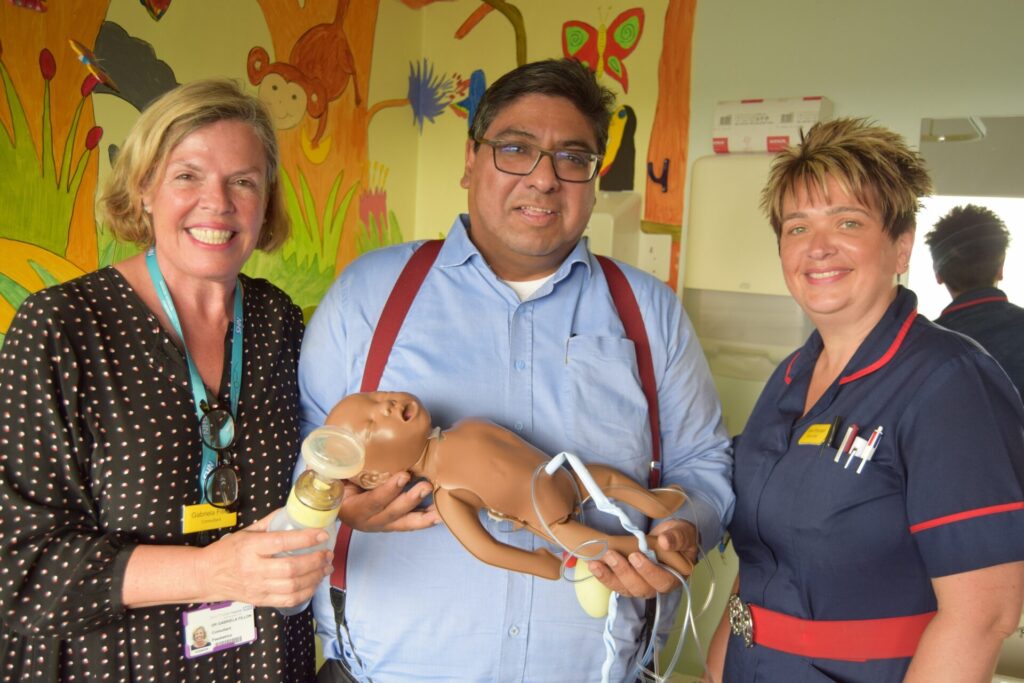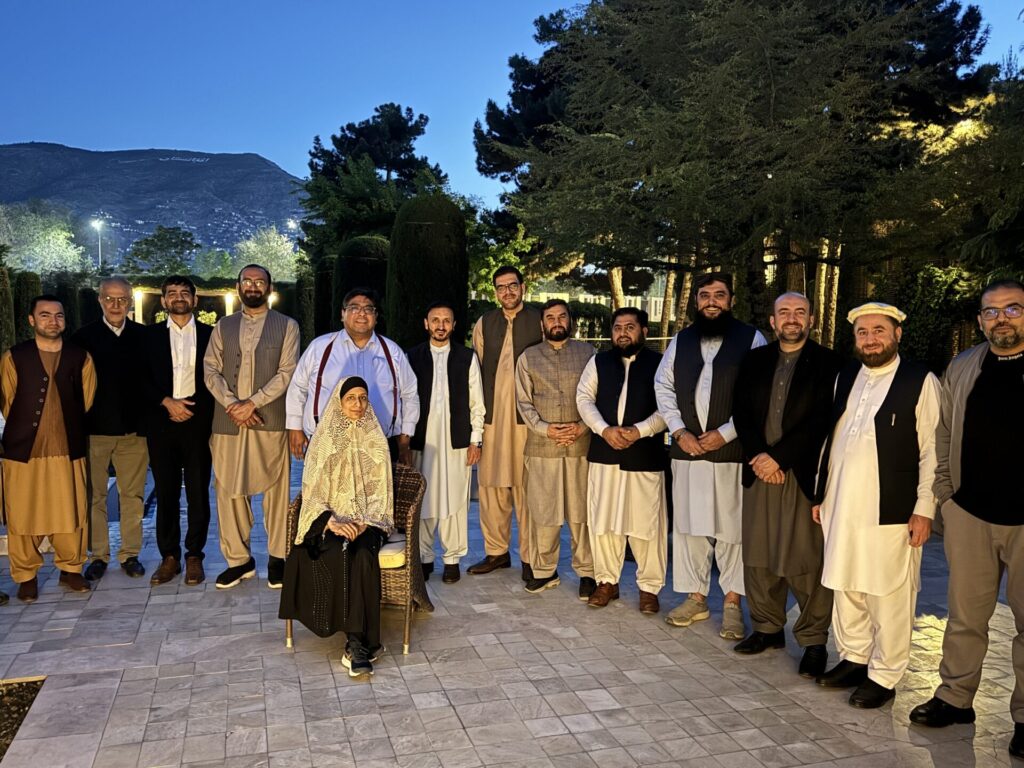Dr Michael Fernando’s life-saving training empowers Afghan medics to improve neonatal care through simple, cost-effective techniques
by Rachael Rowe

It’s often small changes that make a big difference. Dr Michael Fernando, a consultant paediatrician from Yeovil Hospital, has just returned from Afghanistan, where he implemented a project that will save the lives of thousands of babies.
Why Afghanistan?
Afghanistan is one of the poorest countries in the world, ravaged by war and civil unrest. In 2021, the Taliban took power in the country, and has significantly restricted the rights of women. International sanctions have been imposed on Afghanistan, and many aid agencies have withdrawn their support. Infant and child mortality is very high. It was with this in mind that Dr Fernando, who is also Somerset NHS Foundation Trust’s associate medical director at Yeovil Hospital, decided he wanted to find a way to help Afghanis to give their babies the best possible start in life.
‘I loved doing paediatrics at university. Children are amazing. They get sick really quickly, but they also get better quickly. It was one of my first jobs after qualifying. I started with paediatric surgery and then medicine. Then I became a consultant.’
Through Rotary International, Michael had previously led a programme in the Sindh province of Pakistan training the trainers in remote and rural areas how to resuscitate babies at birth.
‘It all started five years ago, when I attended a Helping Babies Breathe course in London where professionals came from around the world to learn how to train trainers in resource-limited settings,’ says Michael.
‘I met a doctor from Pakistan, which at the time had the highest neonatal mortality rate in the world, who asked me to introduce him to Rotary to help spread this training further.’
Michael went to Pakistan, leading the Helping Babies Breathe programme there. After running two ‘Master Trainer’ courses in Pakistan, the American Academy of Pediatrics asked Michael to work with UNICEF in Pakistan, as part of a year-long programme to run ‘telementoring’ in neonatal units there. This was part of a wider multinational project that went on to become a global quality improvement programme in neonatal care.
Two years ago, Katerina Kotsali-Papadimitriou, Rotary International president’s special representative to Afghanistan, asked Michael to run the Helping Babies Breathe programme in the country, working with Rameen Javid from Rotary Kabul City and other Afghan Rotary Clubs.
Michael says: ‘Data suggests that the number of babies who die per 1,000 births in Afghanistan has been reducing in recent years, down from 40 in 2019, to 35 in 2024, but this is still way too high –it’s about one in 30 births.’
Overcoming challenges
Michael had several challenges to overcome in order to get to Afghanistan and set up training.
‘It’s surprisingly easy to get to Afghanistan – there are scheduled flights! The main challenge is getting visas, because the status of the Afghan Embassy in London is unclear. When I was asked to set up this programme I thought it would be difficult because men are not allowed to teach women in Afghanistan, and women are not allowed to treat men, so there’s an immediate block. However, we overcame this by providing a chaperone in the room and that satisfied the authorities. Then, with restrictions on education for girls and with us being an educational programme, I began to think this was impossible and we would never do it. But the people on the ground negotiated – after all, just about everyone wants their child to survive, so people saw the value in what we were trying to do.
‘Most of the doctors who look after babies in Afghanistan are female. It’s not that widely known, but there are women midwives and doctors there. It’s one of the exempt professions in the regulations set down by the government – through sheer pragmatism. Most of the challenges they face are actually a lack of resources in healthcare settings, especially in rural areas.’
Girls in Afghanistan are currently not allowed to study after primary school, which will clearly have an impact on future graduates.
‘That is the situation at the moment,’ says Michael. ‘It is seen as a block with international relations. Although the Taliban are in power, there are far more extreme groups in the country and lots of politics at play.’

The Helping Babies Breathe programme
The programme works by training trainers to spread the teaching methods and materials.
‘When a baby is born, there’s very little that needs to be done in the vast majority of cases, apart from babies needing to be dried, kept warm and given back to mum. Some need to be stimulated to breathe, and a smaller number need air to be pushed into their lungs. Fewer than one in 100 needs more advanced treatment such as chest compressions and medication, like adrenaline.
‘There’s a golden minute where a baby’s life can be saved, by ensuring that the baby breathes.
‘That first minute is the most important part we teach in our training sessions, and we deliberately kept things simple, such as teaching people how to position the head – that can be lifesaving in itself.
‘The programme is cheap, easy and works on a train-the-trainer basis. Master trainers then train others, who then spread the training themselves …
It can work in every country in the world. You need very little equipment – a company called Laerdal provides the equipment at cost price. The Rotary Club also provided kits for teams in Kabul.
‘I got some volunteers to come and help with the training – most were people I had met five or six years ago in London, so we had a personal connection. We paid for our flights ourselves, and did this in our personal time. We were treated very well by our hosts and the facilities in the hospital were very good.
‘Some of the doctors in Kabul were telling me that when the Taliban took over they were quite hostile towards the hospital, because it was seen as part of the old regime.
‘However, when they discovered the work that was happening, their attitudes changed and relations softened. We had a number of female doctors on the programme who had come from more remote parts of Afghanistan: they were very keen to push the training out to these places, and the fact they travelled such long distances to get to Kabul for the programme was heart-warming.’
Already, trainers are beginning to spread the programme far and wide in Afghanistan, helping to save more babies’ lives with simple procedures following a birth.
‘The magic of this programme is that it’s self- supporting, says Michael. ‘There is very little cost involved. They can deliver the programme themselves – it’s independent now.’



